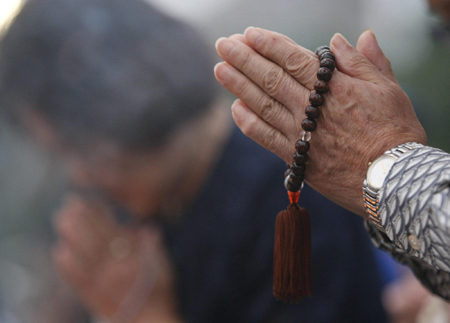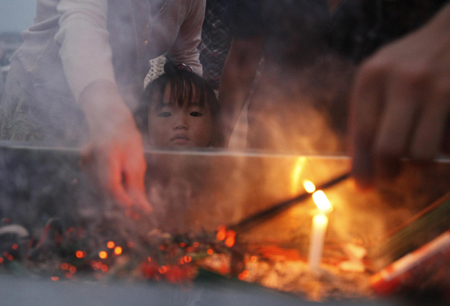Some 50,000 people gathered Thursday at the peace park in Hiroshima to mourn the 64th anniversary of the atomic bombing of the city by U.S. forces during the World War II.

|
|
People pray in front of a cenotaph for the victims of the the U.S. 1945 atomic bombing, in the Peace Memorial Park in Hiroshima August 6, 2009, on the 64th anniversary of the world's first atomic bombing on the city.[Chinadaily.com.cn via agencies]
|
Hiroshima Mayor Tadatoshi Akiba delivered a peace declaration, calling for the abolition of nuclear weapons by 2020.
"The hibakusha still suffer a hell that continues," said Akiba.
"The Japanese government should support hibakusha, including those who were victims of black rain and those who live overseas," he said.
It was reported Wednesday that the Japanese government aims to come to an agreement with all atomic bomb survivors who have sued the government for financial support to help them pay medical bills for illnesses related to the bombings of Hiroshima and Nagasaki.
Akiba also said "The year 2020 is important as we want to enter a world without nuclear weapons with as many hibakusha as possible. We call on the world to join forces with us to eliminate all nuclear weapons by 2020."
Referring to the movements such as the environmentalists, Akiba said, "Global democracy that respects the will of the world and respects the power of the people has begun to grow."
"We have the power. We have the responsibility. We are the Obamajority. And we can abolish nuclear weapons. Yes we can," said the mayor.

|
|
A family burns an incense stick before praying for the victims of the the U.S. 1945 atomic bombing, in the Peace Memorial Park in Hiroshima August 6, 2009, on the 64th anniversary of the world's first atomic bombing on the city.[Chinadaily.com.cn via agencies]
|
On Wednesday, Akiba urged the people around the world to join the city's efforts to abolish nuclear weapons in response to U.S. President Barack Obama's appeal for a world free of nuclear weapons.
During the 50-minute memorial ceremony, a moment of silence was observed at 8:15 a.m., the time the atomic bomb detonated over Hiroshima 64 years ago, killing nearly 100,000 people in a blink.
Also present at the ceremony was Prime Minister Taro Aso, who vowed to adhere to Japan's three antinuclear principles and called for an end to nuclear weapons.
In a speech following that of Akiba, Aso said," Japan will maintain its three non-nuclear pledges of not possessing, not producing and not allowing nuclear weapons."
"The government will continue to do all it can to help survivors of the atomic bombings," he said.
The U.S. bombing of Hiroshima, which took place on the morning of Aug. 6, 1945, led to the deaths of an estimated 140,000 people toward the end of World War II.
On Aug. 9, a second nuclear bomb was dropped on the city of Nagasaki, and six days later, Japan surrendered. In the years since the war, many people have developed diseases that are considered to be related to exposure to radiation created by the bombs.